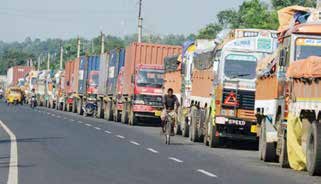NEW DELHI (TIP): Ethnic groups’ protests have erupted in Nepal after the Himalayan nation adopted its first democratic constitution in Sep, 2015. Nepal saw an end to a decade-long Maoist insurgency in 2006 and abolished its centuries-old monarchy two years later.
It spent years since then grappling with writing a new constitution in an attempt to end a period of political drift. India stepped in two phases to help resolve the issues. Firstly, some BJP leaders said they wanted Nepal to become a Hindu state. Later, the NDA government began to negotiate with Nepal on behalf of the madhesis, which the Nepali leadership took as “an external interference”. Indian foreign secretary S. Jaishankar’s last-minute meetings with the Nepali leadership bore no fruit. This was followed by an indefinite economic blockade of Nepal by madhesi agitators.
Nepal has been brought to a standstill after India imposed an “unofficial economic blockade,” according to officials in Kathmandu, following a row over its new constitution. India has rejected these allegations as “totally false”, saying it is the responsibility of the Nepal government to facilitate the entry of trucks.
Hundreds of trucks and tankers carrying everyday supplies have been halted at the Indian border, preventing them from entering Nepal, a landlocked country that has open borders with India to the south, east, and west, and relies on supplies – most importantly food and fuel – coming across.
This is in reminiscent of the closure of 20 of the 22 official entry points by India in 1989, which, most Nepalis say, happened after King Birendra reportedly turned down a breakfast invitation by Rajiv Gandhi in Pakistan during a SAARC meeting.
India has expressed concern over growing anti-India sentiment in Nepal saying it “won’t do any good to both countries”.
“We have noticed anti-India sentiment in a section of media, in social (networking) sites and on the streets. We have taken it up seriously and we have brought it to the notice of the government of Nepal,” India’s ambassador to Nepal, Ranjit Rae said at a press conference in Kathmandu on Wednesday night.
Student wings of Nepal’s political parties have been staging protests in front of the Indian embassy in Kathmandu almost every day after supplies from the Indian side stopped last week.
Expressing concern over anti-India protests in Nepal, the ambassador said the agitation in the Terai districts and difficulties faced in bringing supplies from India were being used to spread anti-India sentiments. “This is Nepal’s internal affair, not an issue between Nepal and India,” he said.
“Torching India’s flag and effigy of Prime Minister Narendra Modi won’t do any good to both countries. That such incidents are happening is a serious matter,” Rae added.
Here are the latest developments:
- “We can only take goods up to the border and beyond the border, it is the responsibility of the Nepalese side to ensure that there is adequate safety and security for the trucks to enter that side,” External Affairs Ministry Spokesperson Vikas Swarup said October 2.
- Long lines of trucks, extending as far as 10 kilometers, have been stranded on the Indian side of the border for over five days. The government says that the trucks are unable to proceed due to the disturbed security situation in the southern Terai region of Nepal.
- But top Nepalese leaders have accused India of violating international laws by halting cross-border trade. “We are not getting fuel, cooking gas and vegetables from India and we don’t want such kind of friendship,” said KP Oli, chief of the ruling UML party, who is tipped to be the next prime minister.
- Amid rising tension with India, there has been increased speculation in Kathmandu over whether fuel could be imported to Nepal from its other neighbor China. But Nepalese officials were quick to play down the reports. “There is no alternative to the road to India,” Prakash Adhikari, press advisor to Prime Minister Sushil Koirala told Reuters. “Getting petrol and petroleum products from mainland China is difficult due to the terrain.”
- In capital Kathmandu, the government has begun rationing of petroleum products to tackle the fuel crisis. “Beginning on Thursday, we are further restricting distribution due to the very limited supplies we have. Private vehicles will not be able to purchase petrol or diesel,” said Laxmi Prasad Dhakal, a home ministry spokesman.
- On Wednesday, trucks from India carrying essential goods and petroleum products started entering Nepal – about 100 cargo trucks entered the country from the Sunauli border in Uttar Pradesh.
